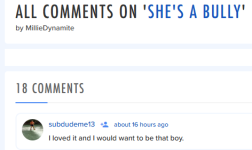StillStunned
Mr Sticky
- Joined
- Jun 4, 2023
- Posts
- 11,213
Yesterday @AG31 discovered a pair of my lesser-read stories and left some very nice comments:
On Angry Fuck - A Vignette:
Thanks again for reading and commenting!
On Angry Fuck - A Vignette:
And on Closeness:Great example of "simple erotica!"
Clever and to the point!! 5 stars.
Thanks again for reading and commenting!


